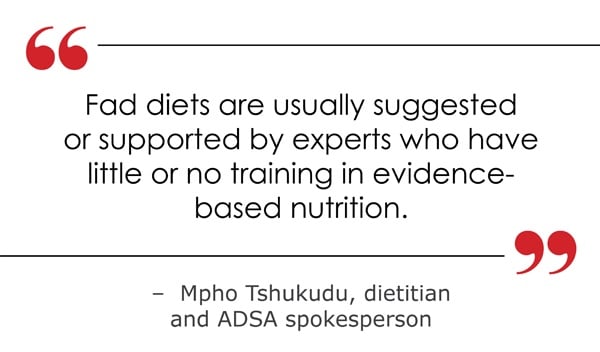
These days we’re bombarded with overwhelming amounts of information telling us what diet we should follow. One day it’s low carb, high fat, the next it’s Paleo, Mediterranean, Atkins or even the Blood Type diet.
It seems impossible to know which one to follow, but dietitian and Association for Dietetics in South Africa (ADSA) spokesperson, Mpho Tshukudu emphasises the importance of understanding that there is no one size that fits all.
Finding the right diet that works for you is a personal thing and should be tailored to your individual needs and lifestyle.
Each patient needs a tailor-made plan
What and how we eat is rooted in our culture, shaped by affordability and mixed with lifestyle factors which include weight, physical activity and emotional connection to food.
“This is where the dietitian comes to the fore,” says ADSA President and Registered Dietitian, Maryke Gallagher.
“If you take a disease such as diabetes, which is a prevalent lifestyle disease in the country, and is a condition that can be managed through diet, each patient needs a tailor-made plan and focused support to make their individualised diet work towards their well-being and health.
“When the situation demands change around something as fundamental to life as food, then broad strokes are not necessarily sustainable solutions.”
“Our genes, environments, activity levels, gender, ages and health statuses are different and they determine our energy levels, macronutrient and micronutrient needs,” adds Tshukudu.
Finding the right plan for you
“Dietitians assess your dietary intake, blood test results, body composition, activity levels, medication and supplements, clinical nutritional status, food allergies and intolerances, among other things,” explains Tshukudu.
Using that information, they will design an eating plan that’s right for you. The plan is assessed at different periods and adjusted if needed.
“No two people’s needs are ever the same because the root cause of their illness is not the same – therefore they will not respond in the same way to one diet,” she adds. “It’s important for patients to pay attention to how their bodies respond to certain foods.”
Separating fact from fiction
Fad diets usually exclude foods from healthy food groups and label them as unhealthy. In addition they offer unlimited quantities of one food or a certain food group with the promise of quick weight loss over a short period of time.
“If you do manage to lose weight, it’s usually only water and not the fat,” says Tshukudu.
Once you stop the diet, you’ll often regain the weight (and more). These diets are usually low in energy, which will leave you feeling hungry most of the time.
“Fad diets are usually suggested or supported by experts who have little or no training in evidence-based nutrition,” Tshukudu says.
Getting down to basics
When it comes to following a healthy diet, Tshukudu has two simple tips.
1. Hydration
Most people struggle with hydration, especially in winter, because water is too cold to drink. Dehydration can negatively affect your health and mimic the feeling of hunger, meaning that most people will eat when they are not actually hungry.
“Aim to drink fluids every time you empty your bladder – it also gives you a chance to stretch your legs and meet your daily step goal, especially if you are sitting at a desk for most of the day.”
2. Vegetables
Eat vegetables with all of your meals, especially the non-starchy ones such as cabbage, spinach, tomatoes, onions, garlic and ginger. Vegetables are high in fibre and antioxidants, so add them to soups, casseroles, stir-fries and smoothies. “Choose fruits and vegetables that are darker in colour and taste bitterer. The bitter compounds are linked to lower BMI, lower body fat percentage and improved lipids.”
You can be healthy, even on a tight budget
Don’t use a tight budget as an excuse to eat poorly.
Healthy foods, such as vegetables, fruit, milk and legumes are easily available and more affordable than processed foods.
Beans, lentils, nuts and seeds are great sources of protein. Raw nuts and seeds are high in protein and contain healthy fats, while beans and lentils are high in protein and fibre, and are low GI.
Tshukudu adds that we should eat vegetables and fruits that are in season. “Or try growing your own vegetables!”
[“source-health24”]

